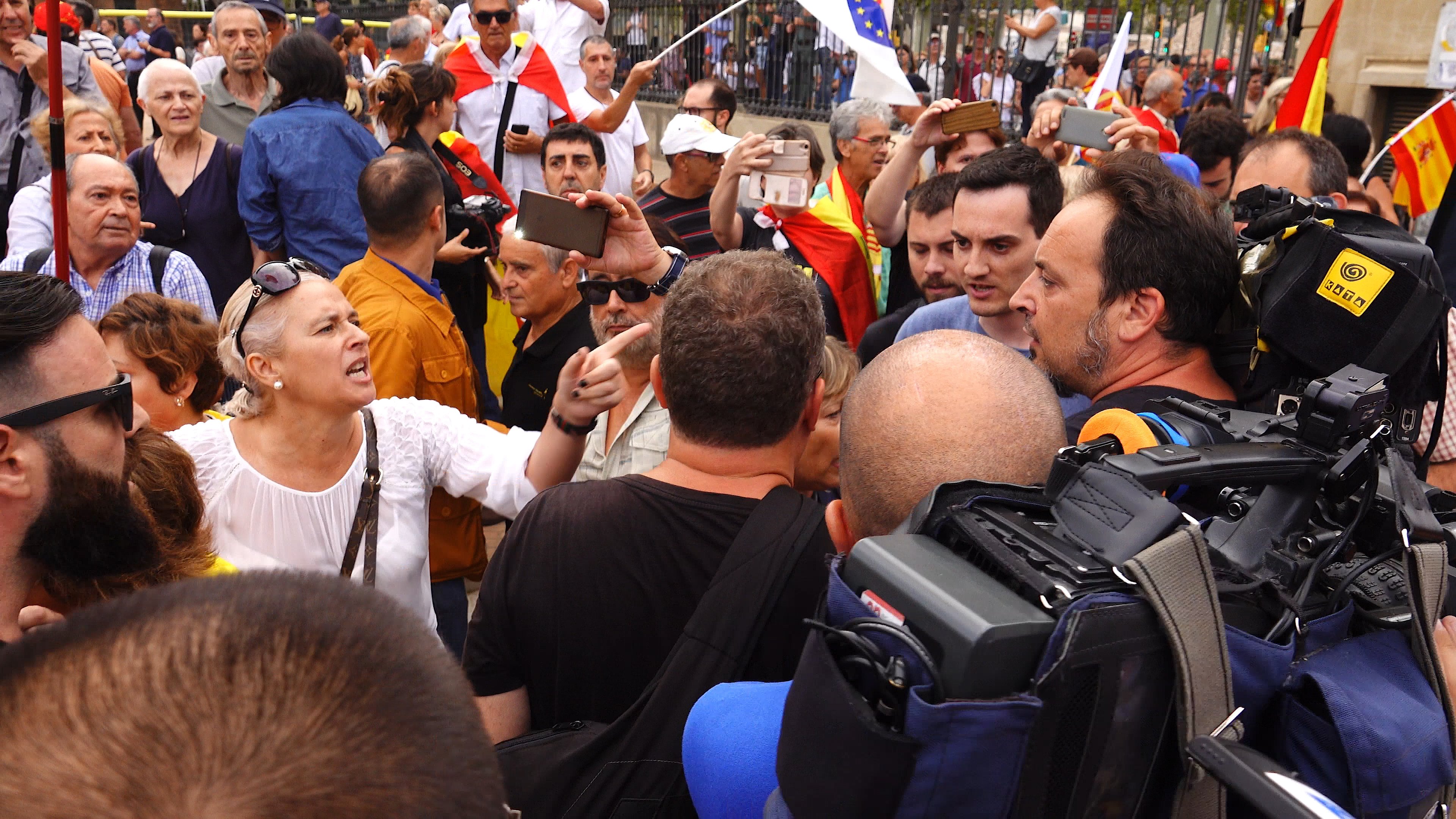It was meant to be a rally against violence and, paradoxically, it ended up in violence. The atmosphere was so tense even before the time it was due to begin that the leaders of the Ciudadanos (Cs) party came and went from the Barcelona protest very quickly. Before Cs national leader Albert Rivera and Catalan head Inés Arrimadas arrived, a camera person from the Spanish capital's Telemadrid channel had already been attacked, having been called out by people in the crowd who claimed he was an employee of Catalan public broadcaster TV3.
In a statement that same Wednesday evening, Cs condemned what had happened. The party attributed the incident to "an infiltrated radical from a group unconnected with the Ciudadanos organization". The problem is that it was not just a single individual, and among those who harassed the Madrid television professional there were others who were not exactly "unconnected". One of these was Isidor Serrano, president of the local Cs grouping in the Barcelona locality of Sant Boi until 2011, and local councillor for the party between 2009 and 2011.
But beyond those who show up at their demonstrations, it is precisely in the municipalities where Ciudadanos have had most problems with the extreme right (also present in Wednesday's protest). So many that, both in Catalonia and in the rest of the Spanish state, the party has been forced to withdraw party lists or appoint managers. But even so, some traces - and some individuals - remain.
One of them is Juan Carlos Ferrando, current spokesperson and number two for Cs in the Mataró city council. He also headed the party's list for this coastal city near Barcelona in the municipal elections 2011, and before that, was a councillor for the Popular Party (PP). But going further back, he was a member of the Falange Auténtica de las JONS - a faction of the Falange, the Spanish fascist party under Franco - and number twenty on this fascist party's list in the 1979 Spanish elections.
When this was made public, Ferrando justified himself saying that he had been 19 years old at the time and that "the Falange was in favour of the things that at that time I wanted for society: social justice, commitment to the people, the defence of Spain and opposition to communists and separatists". Unlike in other cases, Cs has not removed Ferrando from his position.
The case of Alejandro Cano, current spokesperson for Ciudadanos on the council of Sant Feliu de Llobregat is different. The party's top name on its electoral list for this Barcelona municipality did not come from Falangist circles, but rather from the Plataforma per Catalunya (PxC), the ultra-right, xenophobic group which briefly had some electoral success a decade ago. Despite the fact that PxC never actually formed its own electoral list in this municipality, Cano was linked to the party.
As Madrid daily El Mundo reported at the time, Cano attended at least two PxC meetings: on September 3, 2010 in Sant Feliu de Llobregat and on October 23 of that year at L'Hospitalet. He also left comments on the PxC Facebook page - now deleted - that confirm his attendance and membership.
#Hemeroteca C's de Sant Feliu de Llobregat tanca files amb el seu regidor vinculat a la xenòfoba PxC https://t.co/DuOhyv9K6m pic.twitter.com/LSDvUSPqpn
— Jordi Borràs (@jordiborras) 17 de maig de 2018
Translation:
"From the archives: Cs party in Sant Feliu de Llobregat closes ranks with their councillor linked to the xenophobic PxC - Jordi Borràs"
Party lists that raise many questions
But the problem goes significantly beyond two figures holding public positions. During the campaign for the Spanish municipal elections of 2015, Cs had to expel around sixty of its candidates, some of them for their links to the extreme right. This was the case of the number two on the list for Gijón, Agustín Pérez, extreme rightist and Nazi paraphernalia collector, as well as for the number twelve on the party's regional parliament list for Murcia, Manuel Javier Chacón, who had been previously top of the list for the Falange Española de los JONS.
In Catalonia, just three days before the 2015 municipal elections, Ciudadanos had to withdraw its candidacy in the Barcelona metropolitan town of Barberà del Vallès. Its list head, Fran Delgado, had been number three on the PxC list in the previous elections. In most of these cases, Cs took action, having not done so when they originally prepared the list. In the city of Getafe (Madrid), Rivera had to install a manager after expelling three of the five members of the local party leadership for their links with the Falange and another extreme right group, España 2000.
Rivera's anti-independence party also had to eliminate another three members from lists in the Barcelona metropolitan area due to their links to the anti-immigrant PxC: the number 10 on its list for l'Hospitalet, its number 13 for Vilassar de Mar, and its number 20 for Terrassa.
One person who was not expelled was the substitute Cs candidate for Sant Boi de Llobregat in 2007, Jorge Enrique Belsa Colina, who had been on the lists of the Falange Española de los JONS in 1980, and the extremist Juntas Españolas in 1988. He was the lawyer for a key 2012 case against the Catalan government's linguistic policy, representing three families who asked to be given schooling in Spanish instead of Catalan.
These are just a few examples. Ciudadanos has been having problems with "infiltrated radicals" for quite a long time.

